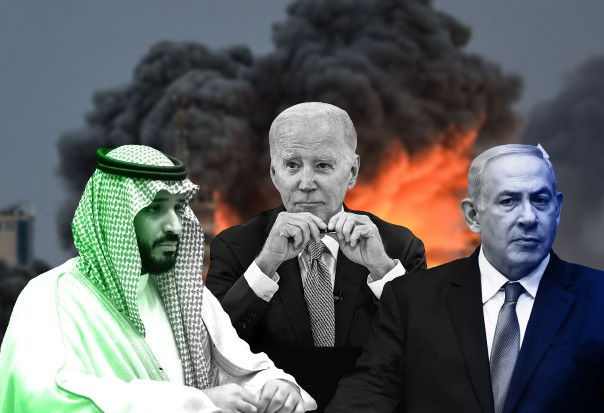
- The suspension of normalization talks with Israel underscores Saudi Arabia’s attempt to align itself with public sentiment without fully committing to substantial measures.
- Qatar’s relationship with Hamas and its need to counter allegations of sponsoring terrorism may limit its influence in long-term peace negotiations.
- As the conflict continues to unfold, the intricate dance of diplomacy in the Middle East underscores the delicate balance that Saudi Arabia must strike between public sentiment, regional dynamics, and its long-term geopolitical objectives.
The dynamic geopolitical landscape of the Middle East has experienced seismic shifts, notably in the wake of the recent Israel-Hamas conflict. Preceding the tragic October 7th Hamas terrorist attack, a notable diplomatic development was in progress – a U.S.-brokered normalization agreement between Israel and Saudi Arabia. This potential agreement held the promise of a significant recalibration of regional geopolitics, with far-reaching implications for the Palestinian national movement. However, as the conflict unfolded, any momentum toward normalizing ties between Israel and Saudi Arabia came to an abrupt halt.
The retaliation by Israel in Gaza has not only galvanized public opinion across the Arab world but has also rendered any resumption of normalization talks politically perilous for Riyadh. Anna Jacobs, the senior Gulf analyst at the International Crisis Group (ICG), emphasizes the toxic nature of such talks for Riyadh amid escalating public frustration with Israel. While demonstrations against Israeli military response have erupted in various regions, Saudi Arabia has been somewhat muted due to strict restrictions on freedom of speech. Nonetheless, social media channels in Saudi Arabia resonate with expressions of anger towards Israel.
In navigating this delicate diplomatic terrain, the Saudi leadership, particularly Crown Prince MBS, has adopted a careful stance. While publicly denouncing Israeli military operations through the Arab-Islamic summit and reiterating support for a two-state solution, Saudi Arabia finds itself under increasing pressure to go beyond the status quo rhetoric.
As the conflict persists and civilian casualties mount, Saudi Arabia seeks a more robust position to assuage public anger. However, its recent call for an arms embargo on Israel is viewed by some analysts, including Jacobs, as a symbolic move rather than a concrete action. The suspension of normalization talks with Israel underscores Saudi Arabia’s attempt to align itself with public sentiment without fully committing to substantial measures.
Normalization with Israel remains a long-term objective for MBS, aligned with the ambitious Saudi Vision 2030 development initiative. Yet, numerous pieces must fall into place, including demands for a comprehensive Palestinian peace process and a formal U.S. security guarantee. These demands, despite criticism of Saudi Arabia’s human rights record, pose considerable challenges for both Israel and the U.S.
Under Saudi Vision 2030, the Kingdom has embarked on a diplomatic recalibration, hosting international summits and mending relations with historical adversaries like Iran. Despite the frozen state of normalization talks, Saudi Arabia continues to leverage its growing diplomatic clout, taking concrete steps to express solidarity with Palestinians. This includes the suspension of normalization talks, setting Saudi Arabia apart from other Arab states that have been less willing to match rhetoric with action, as noted by Elham Fakhro, an associate fellow with Chatham House.
The recent call for an arms embargo on Israel, made during a wartime summit with the BRICS alliance, raises questions about its potential impact on Israeli arms sales, particularly to countries like India. Jacobs expresses scepticism regarding the effectiveness of the Saudi call, emphasizing the challenge of significantly influencing Israeli arms exports.
Saudi Arabia’s approach to the conflict, particularly MBS’s call for an arms embargo, is framed not as a political move but as a humanitarian intervention. Amer Sabaileh, a Jordanian political analyst, highlights that this approach positions Saudi Arabia on the front line from a humanitarian perspective, potentially enabling a more influential role in political negotiations once the conflict subsides.
In the complex web of wartime negotiations, Saudi Arabia finds itself excluded, lacking channels with Hamas. Despite expressed willingness to improve ties with the Palestinian Authority and Hamas, tangible progress has been elusive. Proposals circulating within American diplomatic circles suggest potential roles for Arab states, including Saudi Arabia, in the post-war administration of Gaza. These range from providing military and administrative personnel to more modest contributions such as financing reconstruction. However, Jacobs notes the complexity of Saudi Arabia playing a larger role in Gaza’s governance.
While Saudi Arabia may face challenges in the current negotiations, the U.S. administration sees potential for the Kingdom to play a future role in Israel-Palestine negotiations. Secretary of State Blinken’s recent call with the Saudi Foreign Minister underscores a shared priority for sustainable peace between Israelis and Palestinians.
Looking ahead, the role of other regional players, such as Qatar and Jordan, adds further complexity to the evolving geopolitical landscape. Qatar’s relationship with Hamas and its need to counter allegations of sponsoring terrorism may limit its influence in long-term peace negotiations. Meanwhile, Jordan, despite a hardened stance against Israel during the conflict, is perceived as being on the sidelines.
In the aftermath of the war, Sabaileh predicts that “peace with the Saudis is the only peace Israel will seek.” Saudi Arabia, with its regional influence and economic prowess, is envisioned as the gateway to any prospective peace agreements. As the conflict continues to unfold, the intricate dance of diplomacy in the Middle East underscores the delicate balance that Saudi Arabia must strike between public sentiment, regional dynamics, and its long-term geopolitical objectives.
(The author is a postgraduate student in International Relations at Amity University, Raipur. He writes articles and research papers regularly on international affairs and geopolitics.)
